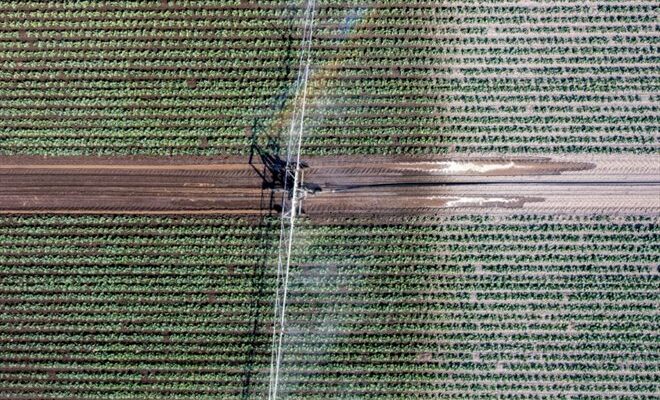Tractors parked near the Berlaymont, headquarters of the European Commission in Brussels, February 26, 2024 (AFP/JOHN THYS)
Fallows, hedges, controls… EU agriculture ministers are looking into a revision of the CAP on Tuesday, unraveling its environmental rules in an attempt to appease the sector, against a backdrop of new demonstrations in Brussels.
To the great dismay of environmental NGOs, the European Commission proposed in mid-March to relax, or even eliminate, part of the strict “green” criteria that the new Common Agricultural Policy (2023-2027), which came into force last year , imposes on farms.
Demanded by States in the face of agricultural anger which has been sweeping the continent for two months, these legislative revisions must now be negotiated and formally approved by Member States and MEPs, by the end of April, before the truce preceding the European elections in June.
The subject arose last week at the summit of leaders of the Twenty-Seven: in their conclusions, they called for “without delay to accelerate work on possible solutions in the short and medium term, aimed at reducing the administrative burden”.
“Agriculture, Green Deal and industry must work together, it is not one or the other, it is about applying the Green Deal so that we can maintain robust agriculture,” insisted Friday Belgian Prime Minister Alexander De Croo, whose country holds the rotating presidency of the EU.

Belgian Prime Minister Alexander De Croo arrives at a European Council summit in Brussels, March 22, 2024 (AFP/Archives/Sameer Al-Doumy)
On Tuesday, ministers will debate the measures proposed by Brussels, while at the same time, a “special agricultural commission” regularly bringing together representatives of the States will formally position itself.
According to a diplomatic source, the required qualified majority already exists among the States, for a text “without substantial change” compared to the proposals.
Anxious to maintain pressure, the Walloon union Fugea and the international alternative agricultural coordination Via Campesina plan to parade some 300 tractors through the streets of Brussels.
“The proposals are insufficient to tackle the root causes” of the agricultural malaise, they indicate in a press release, denouncing “inadequate responses to demands on farmers’ income”, the “unfair practices” of the agri-food industry and calling for “an end to free trade agreements”.
– “Going back” –
After a temporary suspension for 2023 then 2024, Brussels is proposing in particular to completely remove the obligation to leave at least 4% of arable land fallow or non-productive areas (hedges, groves, ponds, etc.) — a criterion that has become a scarecrow for the sector.
Among the other “conditionalities” criticized by agricultural organizations which consider them impractical in the face of climatic hazards: the obligation of crop rotation, which would be replaced by simple “diversification”.

After a temporary suspension for 2023 then 2024, Brussels proposes in particular to completely remove the obligation to leave at least 4% of arable land fallow or non-productive areas (AFP/Olivier MORIN)
EU environmental laws coming into force after 2025 would no longer have to be translated into the CAP. And in the event of extreme climatic episodes, States would be free to introduce exemptions to prevent farmers from incurring penalties.
Finally, the Commission proposes to exempt farms of less than 10 hectares from controls and penalties linked to environmental rules.
Copa-Cogeca, the organization of the majority European agricultural unions, welcomed in a letter to ministers “a step in the right direction (…) bringing more flexibility and taking into account local specificities”, while demanding “clarifications and adjustments.
He also welcomes the blocking for several weeks, at the level of the Member States, of the “nature restoration” legislation aimed at repairing damaged ecosystems, including in rural areas, which he considers “poorly designed, poorly financed” and insufficiently evaluated.
Conversely, in a joint letter, 16 environmental NGOs, including WWF, Greenpeace and ClientEarth, called on Monday the Commission to “withdraw its legislative proposal”, a “step backwards” likely to degrade ecosystems and “thus making that undermine the jobs that the CAP is supposed to support in the long term.
Above all, they say they are “dismayed” that such a legislative proposal was developed “in less than three weeks (…) without prior impact analysis or significant stakeholder consultations” going against EU rules.
The recent agreement to renew the exemption from customs duties for Ukraine while capping certain agricultural products is not officially on the agenda of the ministerial meeting on Tuesday: under the responsibility of the trade ministers, it should be examined on Wednesday at level of ambassadors of the Twenty-Seven.
© 2024 AFP
Did you like this article ? Share it with your friends using the buttons below.




